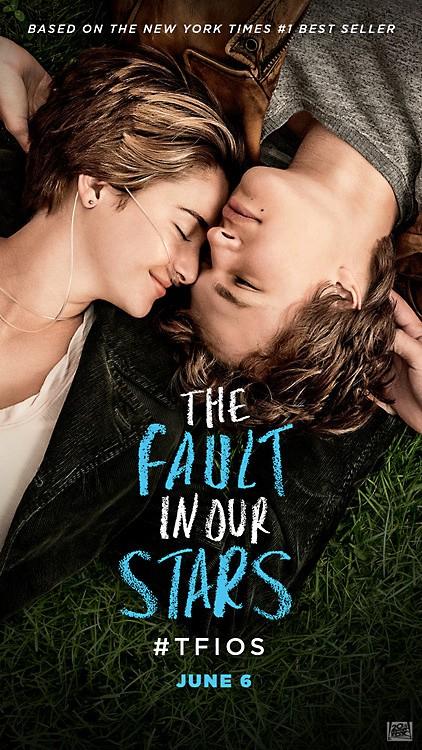Hazel Grace Lancaster (Shailene Woodley) is a sixteen-year-old who’s not too thrilled that her parents are making her attend cancer support group. Due to the cancer in her lungs, Hazel rolls a portable oxygen tank around like a little backpack, tubes running around her head and into her nostrils to give her the basic ability to breathe. Begrudgingly giving in to her parents’ request, Hazel goes to the meetings.
There, she (literally) runs into Augustus Waters (Ansel Elgort), or Gus, a young man who sticks unlit cigarettes in his mouth as a tangible metaphor and whose cancer is in remission after losing the lower half of his right leg. Augustus has come to support his friend, Isaac (Nat Wolff), who is losing his eyesight to cancer. There’s something particularly disturbing about seeing vibrant teenagers having to suffer so horribly.
Hazel and Augustus develop a deep friendship that becomes an intimate relationship. This teen romance film, like its leading couple, has maturity beyond its years due to its dire circumstances. That’s not to say all of the youthful trappings are missing. Hazel constantly checks her phone after she hangs out with Gus for the first time, anxious for a notification that their time was special. The sheer pleasure and goofiness of getting to know someone that clicks with you lights up on the young leads’ smiling faces.
This plays out alongside the everyday presence of death. They wrestle with the permanence of death, the fleeting nature of life and what they’ll leave behind once they’re gone. Of particular gravity is when Hazel confronts her mother (Laura Dern) and her father (Sam Trammell) about what will happen to them once she inevitably succumbs.
These two unique characters wouldn’t be much of anything if it weren’t for Woodley and Elgort infusing the doomed couple with a remarkable amount of humanity, humor and raw emotion. Woodley has established herself as a part of the vanguard of fearless young actresses not concerned with prim and proper Hollywood norms, playing Hazel with no makeup and a dramatic haircut. Elgort proves to be a revelation, storming out of the gates with his second on-screen appearance.
While on a trip to Amsterdam, Gus and Hazel visit the Anne Frank House, a converted museum. Determined not to be defeated by her illness, Hazel climbs the steep stairs inside, step by step. We are close-up on Hazel as her heavy breathing intensifies, causing her to slump against the wall. The music rises and falls, and, in a transcendent move by director Josh Boone, the voice of Anne Frank, coming from the exhibits, plays over the struggle, narrating messages of fighting on in the face of adversity. Sensationally, it is overwhelming.
The film stays true to its source material, but that is not a good barometer of the quality of a film. However, there does seem to be a reverence to the novel that helped the film. John Green, in a rare occurrence for an author, was on set nearly every day, able to provide the cast with the knowledge and intuition of his own book.
I harbor some minor gripes. The film can be slightly uneven at times, and had an awkwardly situated and criminally underused Willem Dafoe.
“Okay” is Hazel’s and Gus’ promise, an ironic declaration of insurmountable love that the two star-crossed teens make to each other. Though their love may be fleeting due to the brevity of their time left, this is a film that deals with elemental fears and questions, all via the hope that is youth.
Grade: A-









